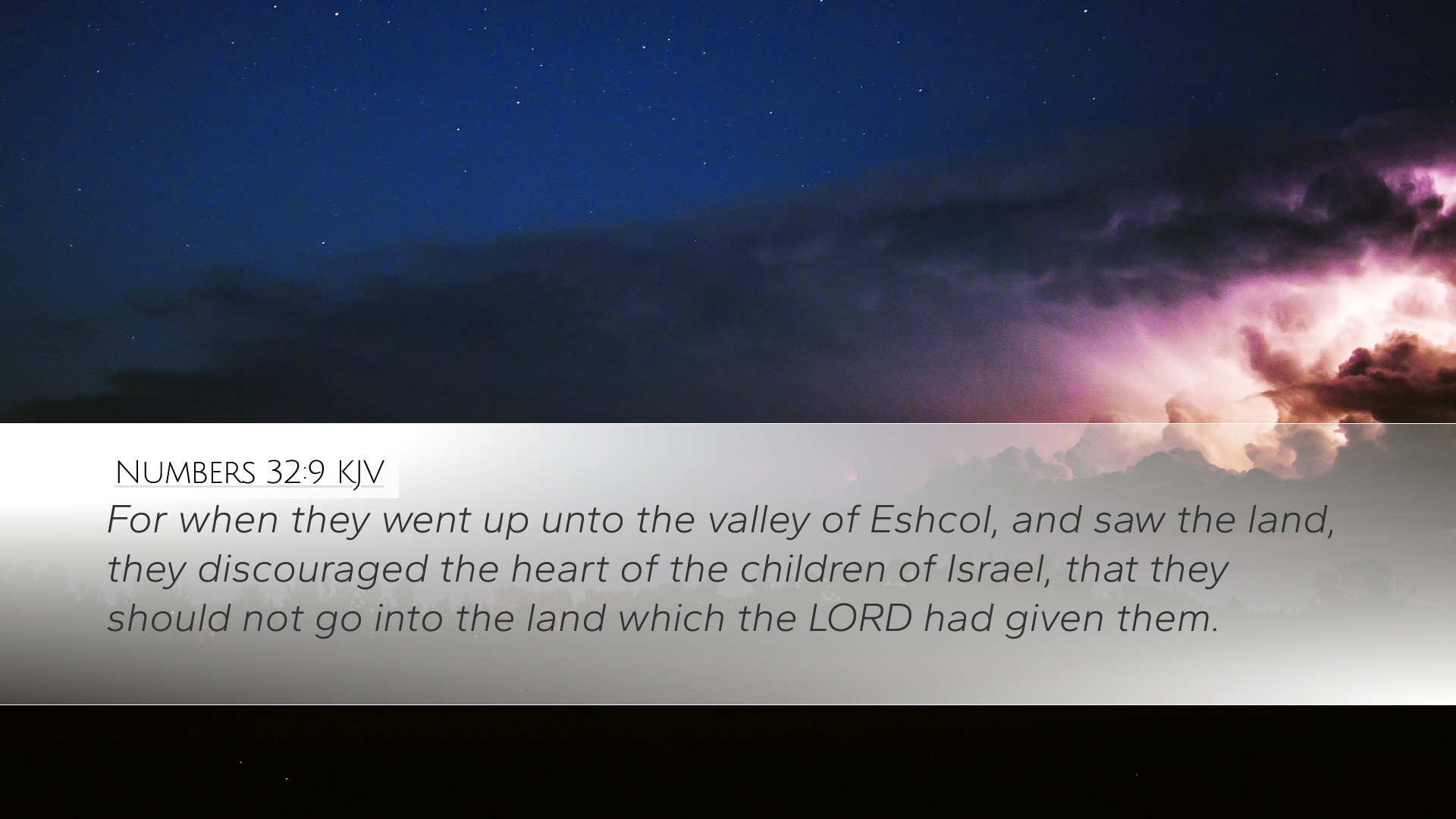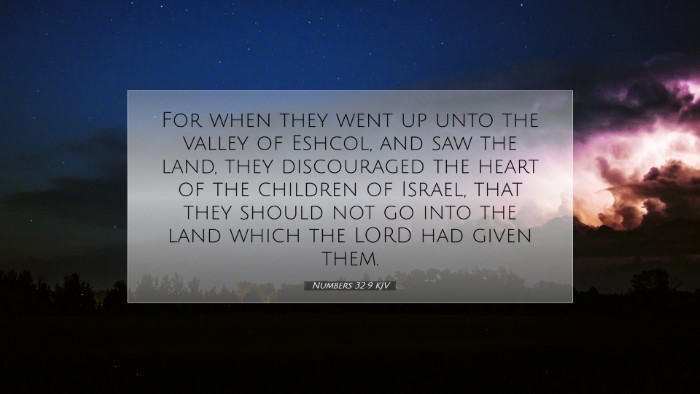Commentary on Numbers 32:9
Numbers 32:9 states: "For when they went up unto the valley of Eshcol, and saw the land, they discouraged the heart of the children of Israel, that they should not go into the land which the Lord had given them."
Overview
This verse serves as a pivotal moment in the narrative of the Israelites' journey to the Promised Land. It highlights the impact of negative reports and fear among the people, underlining the consequences of their lack of faith in God's promises. Through the blending of insights from esteemed commentators like Matthew Henry, Albert Barnes, and Adam Clarke, we can extract rich theological and practical insights from this text.
The Context of the Verse
This passage occurs within the broader context of the Israelites as they approach the Promised Land after years of wandering in the wilderness. The mention of the "valley of Eshcol" refers to a significant location where the spies returned with a report of the land’s fertility, but also fear about its inhabitants. This duality of opportunity and fear represents a crucial turning point for the Israelites.
Matthew Henry's Insights
Matthew Henry emphasizes the importance of faithfulness to God's promises. He articulates how the fear instilled by the unfavorable report of the spies serves as a metaphor for the larger spiritual struggles faced by believers today. Henry notes:
- The Discouragement of the People: The spies' report not only lacked faith but actively discouraged the people, suggesting that negative influences can lead to devastating spiritual consequences.
- The Importance of Wisdom in Leadership: Leaders have a profound responsibility to inspire and uphold the faith of the community, highlighting how poor leadership can result in collective distrust in God's provisions.
- The Consequence of Unbelief: Henry asserts that the combination of disbelief and misinterpretation of God’s commands can lead to missed blessings and destinies previously ordained by God.
Albert Barnes' Perspective
Albert Barnes provides a detailed historical and theological perspective on the events surrounding Numbers 32:9. His key points include:
- Contextual Interpretation: Barnes stresses that the Israelites’ fear was significantly misplaced; they had witnessed God's miracles yet allowed the size of the inhabitants and fortified cities to overshadow their faith.
- The Role of Human Persuasion: The ability of a few to affect the belief of the many underscores the dangers of human persuasion and doubt. He believes that this serves as a cautionary tale against allowing negative perspectives to take root in communal consciousness.
- Encouragement to Trust in God: Barnes encourages the reader to recognize that even in the face of overwhelming odds, faith should prevail, as God's promises hold true irrespective of worldly circumstances.
Insights from Adam Clarke
Adam Clarke provides a more linguistic and expository approach to the text, focusing on the original Hebrew terms and meanings. His contributions highlight:
- Analysis of Key Terms: Clarke elaborates on the term "discouraged," illustrating its deep implications on the community's morale and faith, noting it denotes far more than mere disappointment—it represents a fundamental shaking of faith.
- Application to Modern Believers: He draws parallels to contemporary issues of faith where believers are faced with daunting situations yet called to maintain their trust in God.
- Theological Reflection: Clarke reflects on the theological implications of the spies’ actions: a caution against allowing fear to cloud judgment, which can lead to missed opportunities for entering into God’s rest and blessings.
The Implications for Today
The lessons from Numbers 32:9 resonate powerfully with church leaders, theologians, and laypeople alike:
- Faith vs. Fear: This passage serves as a reminder that challenges may seem insurmountable, but faith in God's promises should guide responses to fear.
- The Role of Testimonies: Personal testimonies and experiences can either uplift or dissuade communities; believers are tasked with fostering narratives that promote faith and perseverance.
- Leadership Responsibility: Leaders within the church must be vigilant against spreading doubt, recognizing their influence on the collective faith of the congregation.
Conclusion
In conclusion, Numbers 32:9 not only recounts a historical moment but also serves as a timeless narrative that challenges believers to climb beyond their doubts into a fuller realization of God's promises. The insights from Matthew Henry, Albert Barnes, and Adam Clarke collectively guide us to cultivate faith over fear and lead others toward the fullness of God's promised rest.


